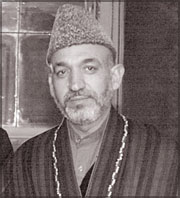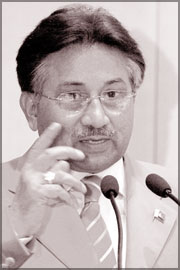|

Russia awaits new Putin role in 2008
On the streets of the country's towns and cities, everything looks
more stable and comfortable than at any time in t he post-Soviet period.
Inside the Kremlin, it is a different story. "Of course individuals
are nervous," deputy presidential spokesman Dmitry Peskov says of the
changes he describes as "a total renewal of the state machine".
He cautions against exaggeration, though. "It's not the last battle
of beasts in the Kremlin. People are on the eve of a completely new
period."
Strange transition
The comparative stability Russia has enjoyed under President Putin
has made people wary of change. In 2008, Russia will undergo a transfer
of power unlike any in its history.

"The tsars and the general secretaries of the Communist Party died
while in office, and Yeltsin and Gorbachev retired with zero ratings,"
notes Vyacheslav Nikonov, a political analyst with close ties to the
Kremlin. "Putin will retire with a rating of closer to 80%. It's
unprecedented."
There is a precedent of people falling from favour as administrations
change. Some of the oligarchs who acquired great wealth and power in the
1990s have fled the country, fearing prosecution. Mikhail Khodorkovsky
stayed. He sits in a Siberian prison cell, convicted of fraud and tax
evasion.
With those kinds of stakes to play for, everyone wants to know what
comes next. 'Tough guys'
Mr Putin's announcement that Dmitry Medvedev would be his preferred
candidate seems largely to have settled the question of the presidency -
although it would be unwise to entirely rule out a further twist in the
race.
Mr Medvedev's rise has been seen as a defeat for the circle of ex
KGB-officers in the current administration - the so-called siloviki, or
tough guys. While they are unlikely to stage an open revolt against Mr
Putin's choice, they may be ready to put obstacles in his way.
"Some groups of KGB people might stage some sort of resistance if
they feel their interests are not respected," suggests Mikhail Krutikhin,
editor of Rusenergia, and a long-term observer of the siloviki influence
on Russian business and politics. The year 2008 will also answer the
question: "What next for Russia's most popular politician?"
Mr Medvedev has offered Mr Putin the prime minister's job. Until his
acceptance, Mr Putin seems to have kept even Kremlin insiders in the
dark.
Numerous options were talked about. It was suggested, for example,
that Mr Putin could become head of Russia's national security council -
a role which is not clearly defined, and which he could therefore make
his own.
The quandary of what to do with a popular Russian leader still in the
land of the living continues to perplex. "There may be a weaker
president if Putin stays on the scene," concedes one source close to the
administration. "Putin knows this and probably has something in mind."
It is an issue not just inside Russia, but around the world.
Russia is on the rise again as a global power - keen to win respect
and support for its views on issues such as the future of Kosovo and the
Iranian nuclear programme. This new sense of strength is founded on the
wealth which has come with soaring prices for the natural resources
which Russia has in abundance.
As demand for oil and gas continues to grow, many in the West are
looking warily eastwards, wondering whether Russia is a reliable
partner. There are concerns that a future political dispute could lead
to the taps being turned off.
The gas row with Ukraine two years ago did massive damage to Moscow's
reputation. There is a sense now that Russia has learned a lesson.
"I don't know of any single study or plan to use oil and gas as a
weapon vis-a-vis Europe, and I know most of the thinking on that
matter," Sergei Karaganov, of Russia's Council on Foreign and Defence
Policy told me. "So for me, when I hear these kind of ideas from the
West, they seem bizarre."
BBC
Karzai, Musharraf 'to co-operate'
Pakistani President Pervez Musharraf and his Afghan counterpart,
Hamid Karzai, have pledged to co-operate in the fight against Islamist
militants.
At a meeting in Islamabad, the leaders said terrorism had brought
suffering to people in both their countries.
Ties between the neighbours have often been strained, with mutual
accusations of inaction against Taleban militants.
 The cordial tone of the leaders' latest meeting contrasted with past
exchanges, BBC correspondents say. The cordial tone of the leaders' latest meeting contrasted with past
exchanges, BBC correspondents say.
The leaders referred to their countries as twins and emphasised the
shared threat from Islamist militants sympathetic to the deposed Taleban
administration of Afghanistan.
"The key in fighting and enhancing the capability against terrorism
and extremism is intelligence cooperation," Mr Musharraf said.
"The two intelligence agencies, on both sides, must cooperate more
strongly if we are to deal with terrorists and extremists more
effectively."
Mr Karzai said it was "incumbent" upon the two governments to "bring
peace and stability".

He also acknowledged US reports that attacks across the
Afghan-Pakistan border had fallen recently. Taleban-linked militants
based in the rugged Afghan-Pakistan border have been broadening a
violent campaign against both countries' governments.
Mr Musharraf and Mr Karzai are both allies of the US and have
frequently accused each other of offering sanctuary to the Taleban.
They have also in the past made similar pledges to co-operate against
the militants. Expulsion row Separately, Mr Karzai's government is under
diplomatic pressure to cancel an order for the expulsion of two top
international officials accused of talking to the Taleban.
A British UN employee and an Irishman heading the EU mission in
Afghanistan have both been ordered to leave the country by Thursday.
According to the government in Kabul, the officials' alleged contacts
with Taleban leaders in Helmand province had endangered national
security.
BBC
Serbian MPs issue Kosovo warning
The Serbian parliament has voted overwhelmingly to condemn any
attempt by Kosovo to become independent.
Authorities in the province say they will declare independence
unilaterally in the coming weeks, because talks with Serbia have made no
progress.
The Belgrade parliament's resolution calls for action against those
who recognise an independent Kosovo. The province is still formally part
of Serbia, but has been administered by the United Nations since 1999.
The UN took over after a Nato-led assault drove out Serb forces who had
been accused of persecuting Kosovo's ethnic Albanian population.
'Destructive America'
After eight hours of debate on Wednesday, Serbian MPs approved the
resolution by 220 votes to 14.
It rejects the idea of the EU setting up a mission in Kosovo before
the province's status is resolved.
The text also accuses Nato - which has 16,000 peacekeepers in Kosovo
- of supporting ethnic Albanians, who account for about 90% of the
population. The resolution says Serbia will "reconsider" diplomatic ties
with Western countries that recognise Kosovo's statehood.
The US and several EU states have indicated they may do so. During
the debate in parliament, Prime Minister Vojislav Kostunica accused the
US of blocking efforts to find a compromise with ethnic Albanians by its
open support of Kosovo's independence.
"America is openly striving for the destruction of the international
order," Mr Kostunica said.
He added that Serbia would not join the EU if the bloc recognised
Kosovo's independence.
"Serbia can join any integration only as a whole and not a truncated
country," he said.
The opposition Liberal Party leader Cedomir Jovanovic - who does not
oppose Kosovo's independence - said the resolution was a blow to
Serbia's ambitions to become an EU member.
BBC |
